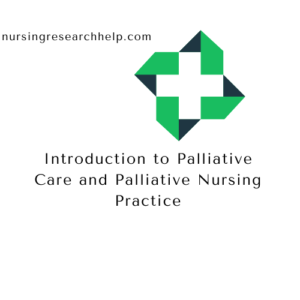Introduction to Palliative Care and Palliative Nursing Practice

Palliative care and palliative nursing practice is the practice of providing care and support to individuals and families during the final stages of a life-threatening illness. While this type of practice is primarily focused on enhancing quality of life, it also has an important role to play in the care of patients who are dying. This article will discuss the Introduction to Palliative Care and Palliative Nursing Practice which will include definition of palliative care, the role of the palliative nurse, and legal and ethical issues in the practice of palliative care.
Introduction to palliative care
Palliative care is a multifaceted area of nursing practice. It encompasses the assessment of patients’ emotional and physical health, the preparation of advance directives, and the delivery of symptom relief through a variety of interventions.
Nurses can also facilitate discussions of sensitive topics in a supportive manner. They are trained to recognize changes in a patient’s health status, communicate with a patient’s family, and coordinate care between different levels of healthcare providers.
Nurses are the primary link between a patient and his or her family. As the largest group of healthcare professionals, nurses are well positioned to serve in this role. However, their role often remains unacknowledged.
This is particularly true in many parts of the world. While some nations have a formal certification process, others do not. A lack of education can keep nurses from providing helpful care.
To become a palliative care specialist, nurses need to understand basic concepts, including pain management, symptom management, and patient-centered care. Furthermore, they must be able to navigate the ethical issues involved.
What are palliative care and palliative nursing?
Palliative care is a holistic approach that addresses the complexity of the needs of patients. It is based on an interprofessional approach and involves a team of specialists that work together with a patient and his or her family. The goal is to improve the quality of life of the patient and the entire family by addressing pain and other symptoms, and by managing side effects of treatment.
Nurses play an important role in palliative care. They are the main link between a patient and his or her family, and act as a liaison between other health professionals. As a result, their performance depends on their skills and abilities in relational, practical, and moral dimensions of care.
In some countries, nurses have formal certification examinations in palliative care. Other countries require continuing education to maintain their qualifications.
Palliative care is appropriate at all ages and stages of disease. It addresses the physical, emotional, and spiritual needs of the whole person. Ideally, it is provided in conjunction with curative intent treatments, but is also appropriate alone.
The role of the palliative care nurse
Palliative care is a specialty area of nursing that focuses on improving physical and emotional symptoms. Palliative care involves symptom management, advocacy, and communication. A nurse’s role in palliative care is crucial.
Nurses are the link between different levels of healthcare. They act as a liaison between the patient and their family, and provide support and education to both. However, some nurses are better equipped than others to build relationships with patients and families.
Nursing is a complex profession. It is a highly skilled art that requires many activities, including clinical skills, communication, and interpersonal abilities. There are also moral and relational considerations. The role of a nurse is often undervalued or poorly attributed.
An ideal nurse is attentive and dedicated to the task at hand. She or he must have a firm grasp of the core principles of care, as well as the most advanced medical knowledge. Additionally, nurses must be able to work independently as part of a multidisciplinary team.
A key component of the nurse’s role in palliative medicine is providing emotional support to the patients’ family. This may include helping the patients’ relatives make informed decisions about treatment options.
The context of palliative nursing practice in the nursing practice
It is important for all nurses to become familiar with palliative care and the role of nursing in it. Palliative care is a specialized medical care that can be provided to patients with all stages of serious illnesses. The focus is on improving the quality of life for patients and caregivers, especially at the end of their life.
Nurses have a natural role as a coordinator of care for other health professionals. However, they also need additional training and expertise to be able to carry out the role successfully.
In order to be effective in providing palliative care, nurses need to be committed and have evidence-based standards. They must also be able to document the results of their work.
New roles are emerging within the nursing profession. These may involve education, research, and direct patient care. By being well-versed in palliative care, nurses can better advocate for their patients and their families.
A major challenge is early palliative care integration. This can be a cultural barrier, as well as a practical one.

Legal and ethical issues in palliative care
In delivering palliative care, ethical issues arise on a daily basis. These include conflicts between medical staff and patients, as well as with family members.
The majority of the ethical challenges reported by health professionals in the literature were context-specific. This means they may not be transferable between settings. Moreover, the range of challenges is much greater than the number of relevant texts and training programs.
Across a number of clinical specialties, including general practice, hospice care, and dialysis, practitioners reported challenging ethical situations. Some of these include genetic elements of the conditions, issues with communication and decision-making, and conflicts with other clinical specialties.
While many of these challenges have not yet been explored, there is a growing need for a comprehensive synthesis of ethical dilemmas faced by specialist palliative care practitioners. By synthesizing the available evidence from expert practitioners, staff can be better supported and trained.
To identify the most common ethical challenges faced by specialist palliative care practitioners, a systematic review was conducted. A search of seven databases was performed, from inception to December 2019, and 8074 records were screened.

the broad values shared by palliative nurses
Palliative nurses are a special group of healthcare professionals who care for patients with life-threatening conditions. The goal of palliative care is to improve the quality of life for patients and their families.
A palliative nurse’s performance depends on a combination of moral, practical and relational skills. Compassion and generosity are key traits in this profession. In addition, they must be dedicated, flexible and committed to patient care.
Nurses’ roles vary depending on the type of health system and patient. For example, an acute care RN may have additional training to become a hospice nurse. It is important for palliative nurses to understand their legal obligations.
They must also be committed to the well-being of the patient and their family. As a result, they have to make informed decisions and work with a team of professionals.
Palliative nurses often play a vital role in community models of care. This type of care is focused on the delivery of hospice and palliative services in conjunction with established delivery systems.
palliative nursing values
Palliative care is an approach that aims to improve the quality of life of people suffering from life-limiting illness. It is an interdisciplinary and comprehensive approach to health care. Symptom management, psychosocial support, and patient and family involvement are some of the main concerns of palliative care.
Having an introduction to palliative care can help nurses better understand their roles in the delivery of palliative care. As one of the primary health care professionals in many countries, nurses are especially involved in early and late stages of palliative care. This article explores the role of nurses in early and late palliative care, discusses the challenges, and outlines potential solutions.
Nurses are well-suited to advocate for the rights of patients and families. Their ability to advocate for patients and caregivers is a great asset to the delivery of palliative care. During the early and late stages of palliative disease, they may have the opportunity to discuss medical decisions, prognosis, and advance care planning with their patients.
One important role that nurses play in the process of palliative care is to encourage open communication with their patients and their families. Communicating with the patient and the family in a compassionate and supportive way allows the nurse to address their medical and emotional needs.
Conclusion
Palliative care is a multidisciplinary approach to the management of an illness. It aims to provide relief from suffering for patients with life-limiting illnesses.
There are many factors that influence the quality of palliative care. The role of nurses is a particularly important one. They provide coordinated, interdisciplinary care for patients and their families. While they are natural leaders in delivering evidence-based symptom management strategies, they need training and support to do their job well.
Although there are many ways to practice palliative nursing, one of the most important is to know the patient. This knowledge allows nurses to build positive relationships and advocate on the patient’s behalf. As nurses, we have a natural inclination to provide end-of-life care. However, this practice can be stressful and overwhelming.
Several studies have shown that nurses can better support the needs of a patient’s family by providing emotional and practical support. They can also help build and maintain a supportive network of peers. These connections can help alleviate the stresses of the caregiving process.
Hire professionals to write palliative care fast
If you are facing difficulties in completing your palliative care assignment, hiring professionals can help you out. Our writing company specializes in different topics related to nursing. With our writers experience and knowledge, they can write a high-quality and accurate assignment for you. Moreover, they know all the necessary information that you will need to pass your assignment. We are always available to handle any orders and questions you might have.


